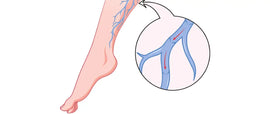9 Common Symptoms of Diabetic Neuropathy
Posted by SIMON LIM

Diabetes can affect your entire body. One of the its most common and potentially debilitating symptoms is diabetic neuropathy. Diabetic neuropathy is a disease that damages the nerves in your body, often affecting your feet first.
This can cause pain, numbness, and weakness, making walking difficult. That's why it's essential to be aware of the symptoms of diabetic neuropathy so you can take steps to prevent or treat it.
In this article, we will discuss the symptoms of diabetic neuropathy and how they may affect your quality of life.
What is Diabetes?
Diabetes is a condition that occurs when your body can't properly use sugar, which is a type of carbohydrate. When you eat certain foods, your body breaks it down into sugar, which provides energy for your cells.
Your blood carries the sugar to all parts of your body. The hormone insulin helps the sugar enter your cells and stay there until it's needed for energy.
If you have diabetes, how your body uses food and sugar is affected.
There are two types of diabetes: type 1 and type 2.
Type 1 Diabetes: Your body's immune system mistakenly attacks the cells in your pancreas that produce insulin. Type 1 diabetes is an autoimmune disorder.
Type 2 Diabetes: This occurs when your cells stop responding to insulin or start ignoring it. Your pancreas responds by producing more insulin, but eventually, it can't keep up with the demand. This is called insulin resistance.
In both cases, blood sugar levels rise too high because there isn't enough insulin to move glucose out of the bloodstream and into cells where it can be used as fuel. Overtime, this can lead to other problems such as diabetic neuropathy.

What is Diabetic Neuropathy?
Diabetic neuropathy is a condition that occurs when people with diabetes have changes to their nerves. The condition can cause pain, numbness, or tingling in the hands and feet. It can also cause loss of feeling in the lower legs and feet, called "foot drop."
Neuropathy basically means nerve damage, usually affecting the longest nerves in the body first. People who have it will usually feel symptoms in their feet before noticing any problems with their hands.
What Causes Diabetic Neuropathy?
Diabetes affects blood vessels throughout the body. When it affects nerves in the legs or feet, it can cause diabetic neuropathy. This type of nerve damage happens over time because of high blood sugar levels.
The nerves become damaged from having too much sugar circulating through them over time. This causes problems with feeling sensations like touch or pain as well as motor functions like muscle movement and balance control.
Three Main Types of Diabetic Neuropathy
Peripheral Diabetic Neuropathy
This affects the legs, causing numbness or tingling sensations along with weakness or paralysis. This can happen anywhere from your knees down. It also causes problems walking due to nerve damage caused by diabetes.
Autonomic Diabetic Neuropathy
This affects nerves that control bodily functions such as blood pressure and heart rate, causing symptoms such as dizziness, fainting spells, low blood pressure, and rapid heartbeat.
Proximal Diabetic Neuropathy
This affects trunk area (chest and abdomen). This type of diabetic neuropathy can cause symptoms such as changes in bowel habits (diarrhea or constipation), bladder problems (difficulty urinating), or sexual dysfunction.
Other Types
In addition to these three main types of diabetes-related peripheral neuropathies, there are other forms of peripheral neuropathies. It include focal demyelination and multifocal motor neuronopathies. It could be an underlying systemic disease that diabetes itself may cause.

Symptoms of Diabetic Neuropathy
Diabetic neuropathy can affect any body part, but it's most commonly found in your feet and hands. It can also affect your legs and arms, but this is less common. There are many symptoms and signs of diabetic neuropathy, some of which are more common than others.
- Your legs don't feel right. Numbness or tingling in your feet may be a sign of diabetic neuropathy. It can happen anywhere from your knees down and can come on gradually, or it can happen suddenly.
- You have trouble walking. Nerve damage caused by diabetes can cause weakness, numbness, and pain in your limbs. You might not even realize you have it until you try walking or climbing stairs and find that you stumble or can't do it.
- You have pain in your feet when you walk or stand for long periods, especially if you've had diabetes for many years.
- The feeling returns when you sit or lie down for a while after standing or walking around. This is known as "paralysis agitans”. When you stand up again, your muscles may feel weak because they were working harder when they were not getting enough sugar to work well with oxygen.
- You have loss of sensation in the feet. The nerve damage caused by diabetes can affect the ability to feel sensations such as heat, cold, and pain.
- You have trouble keeping your balance and coordination. It can be difficult to walk, and it's common to trip or lose your balance.
- You can't get to sleep at night because of restless legs syndrome (RLS). You might feel like you're walking on pins and needles.
- You always feel tired (even after a good night's rest). The feeling of tiredness is called fatigue, and it's another sign of diabetic neuropathy because of its effect on the way your body uses energy efficiently.
- Your hands need to be fixed like they used to. If your fingers are numb, tingling, or weak, this could be a sign of diabetic neuropathy. It could also cause burning, stabbing pain in your hands and arms that won't go away.
Takeaways
The most common symptoms of diabetic neuropathy are numbness, tingling, pain, and loss of sensation in the feet. Other symptoms include muscle weakness or paralysis, lack of coordination, loss of balance, and difficulty walking. Many people with diabetes don't know they have diabetic neuropathy because it can be tricky to diagnose.
The best way to detect it is through regular screenings and visits with your doctor. They can look for signs like numbness in your feet, legs, hands, or arms. If you experience any of these symptoms, talk to your doctor about whether you may have diabetic neuropathy. The sooner you get treatment, the better off you'll be!
SHARE:




































